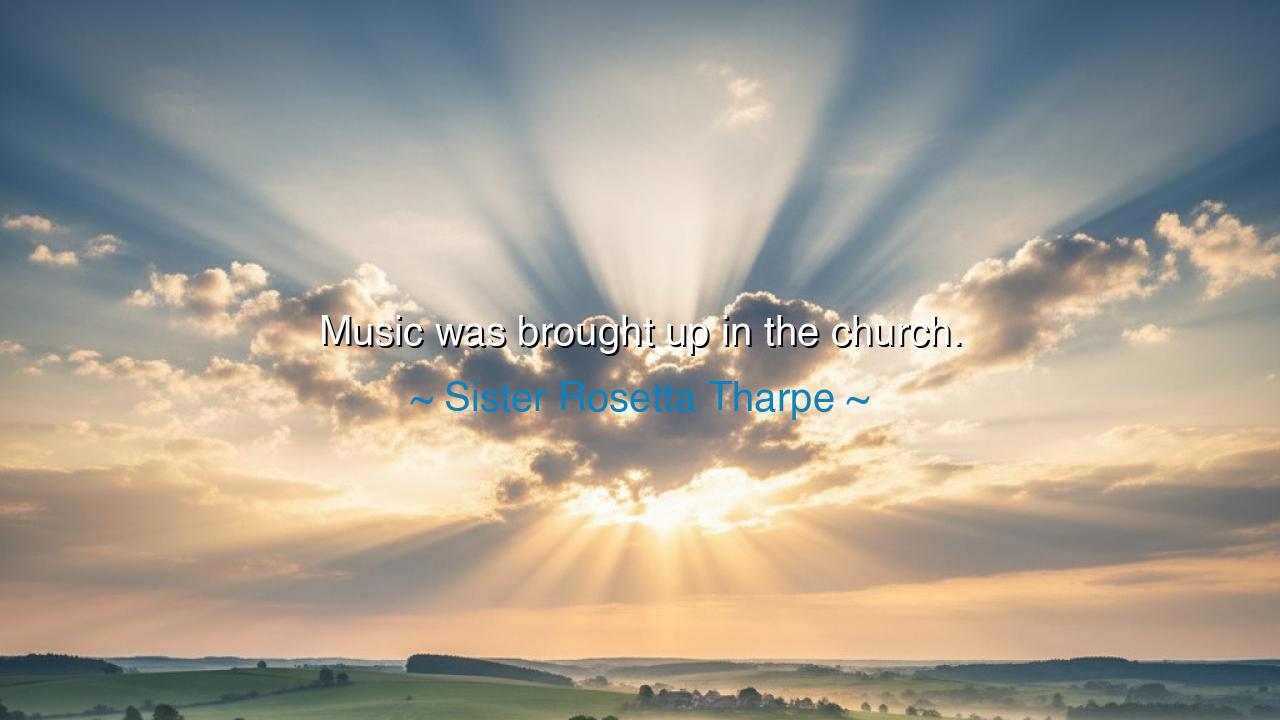
Music was brought up in the church.






Hear the words of Sister Rosetta Tharpe, mother of gospel and rock and roll, who proclaimed: “Music was brought up in the church.” In this brief but burning truth, she points us to the sacred cradle where so much of modern sound was born. For before it rang in concert halls and stadiums, before it filled radios and arenas, music was nurtured in sanctuaries, shaped by prayer, lifted by worship, and ignited by the cry of the soul reaching for heaven. The church was not merely a building—it was the forge where voices, rhythms, and melodies were tempered in the fire of faith.
To say that music was brought up in the church is to recognize that many of the sounds that move the world today—blues, jazz, soul, rock, and gospel—trace their lineage to songs of worship and lament sung in holy gatherings. In those places, people lifted their voices not for fame or profit, but for survival, hope, and praise. From the clapping of hands and the stomping of feet, from the wail of choirs and the hum of organs, a new language of the spirit was born. Sister Rosetta herself carried the electric guitar into those hallowed halls, merging sacred lyrics with fiery rhythm, birthing a sound that would later ignite generations of musicians.
Consider the enslaved Africans in America, who in the shadow of oppression forged spirituals—songs of sorrow and deliverance, sung in the fields and in secret prayer meetings. These were the ancestors of gospel, of blues, of jazz. Their voices, raised in pain and faith, brought forth melodies that would one day shape the very backbone of American music. This is the deeper meaning of Tharpe’s words: that music did not come from silence, but from the cries of the oppressed, lifted heavenward within the walls of the church.
History bears this truth again in the life of Sister Rosetta herself. With her bold guitar riffs and gospel fervor, she stood in revival tents and church choirs, declaring the glory of God. Yet her sound reached beyond the pews, catching the ears of those who would later become legends—Elvis Presley, Johnny Cash, Chuck Berry. They learned by watching her that the fire of music, born in the church, could leap beyond the altar and set the world ablaze.
The meaning is clear: the church was not only a place of worship, but a wellspring of creativity. It was the womb of rhythm, harmony, and song, because it was the place where ordinary men and women met the extraordinary presence of God. When the spirit descended, the people sang, and in their singing, the roots of countless musical traditions were planted. From those sacred roots came fruits that continue to nourish the world.
The lesson for us is profound. Music, when it is true, must remain connected to the spirit, to authenticity, to the raw cry of the heart. Whether it is sung in sanctuaries or on the stage, its power lies in its honesty, its ability to uplift, to heal, to bring people together. Sister Rosetta’s wisdom teaches us that the strength of music is not in fame or fortune, but in its origin—its grounding in something greater than ourselves.
Practical action follows. When you make or listen to music, do not treat it as mere entertainment, but as a sacred encounter. Ask yourself: what spirit is being carried in this sound? Does it uplift, does it heal, does it tell the truth? If you are an artist, root your creations in sincerity and conviction, as the great ones did before you. If you are a listener, let music be not only a background noise but a guide for the soul, lifting you higher, as it lifted generations who sang in the church.
Thus the words of Sister Rosetta Tharpe endure: “Music was brought up in the church.” Let them remind us that the songs we hear today are echoes of prayers once whispered, shouts once lifted, praises once thundered in humble sanctuaries. And let them teach us that every true song is more than sound—it is the meeting of heaven and earth, a gift from the spirit, to be cherished and carried forward with reverence and joy.






AAdministratorAdministrator
Welcome, honored guests. Please leave a comment, we will respond soon